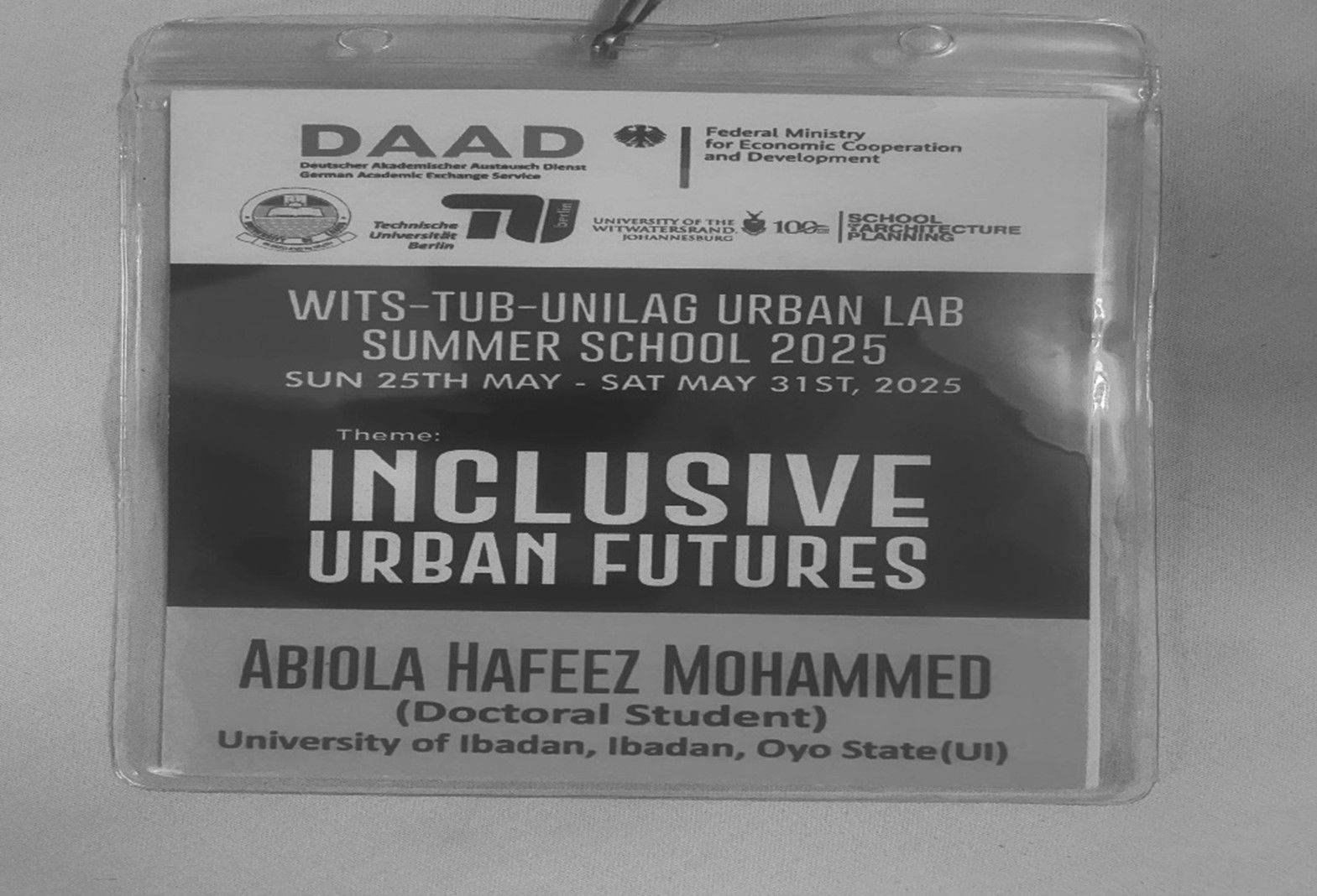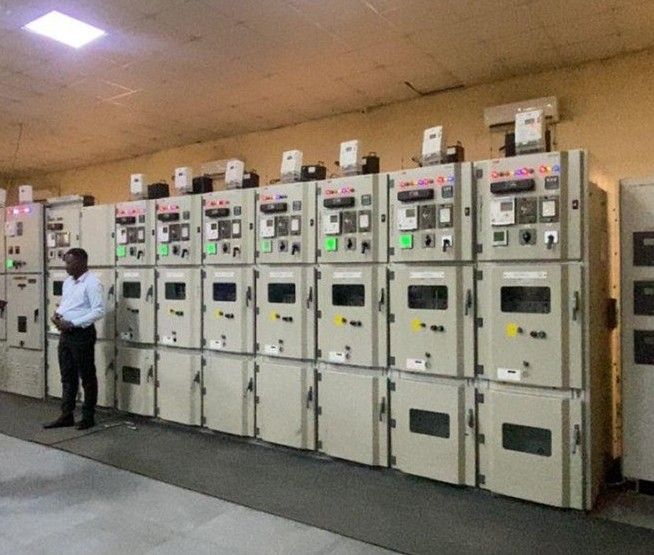PhD Student Abiola Mohammed reflecting on Summer School 2025
Department of Sociology, University of Ibadan, Ibadan, Oyo State | Partnership for African Social and Governance Research (PASGR), Nairobi, Kenya
Does National really mean Inclusive?

Name tag for the Wits-TUB-UniLag 2025 Summer School. Source: Author.
The 2025 Wits-TUB-UniLag Urban Lab week-long summer school/doctoral writing workshop, themed Inclusive Urban Futures, started with a study tour of Redemption City in Ogun State. A fellow PhD candidate from the Federal University of Technology, Akure (FUTA) was my bus seat partner as we journeyed to the city and raised a question that stayed with me after our conversation and even after the tour: “Does global really mean inclusive?”. This question prompted a personal reflection about my research on urban disaster management in Nigeria and led me to a parallel question: “Does national really mean inclusive?” A critical review of national policy instruments and interventions targeted at urban disaster management provides that the answer to this question, particularly in the Nigerian context, is more often no than yes. This is as the country continues to grapple with accelerating urbanization and intensifying environmental hazards.
Projections estimate that 70% of Nigeria's population could reside in urban areas by 2050. This rapid urban growth might indicate some sort of development, but it also signifies the strong vulnerability of Nigeria to hazards such as flooding. The Nigeria 2024 Flood Data Report¹ provides concrete evidence of this with 2,854 injuries recorded, an estimated 741,000 people displaced by flood, and 121,000 affected houses in Nigeria in 2024 alone. Despite the emphasis of policies and targeted interventions on community-based approaches to disaster management, the operational model remains heavily top-down², often marginalising inputs from the very flood-affected communities it purports to serve. This disconnect, therefore, necessitates policy imperatives that must be designed or re-designed to effectively incorporate community-centred experiences and local knowledge systems in the pursuit of an inclusive urban future. Perhaps a striking example of this disconnect was seen on day 2 of the workshop where there was a conflicting interaction between an invited town planner lamenting the failure of an intended intervention and a community representative who claimed the intervention was not suitable to answer the needs of the community it was meant for as said community was not consulted in the process. Experiencing that very brief interaction, one need not be a rocket scientist to understand why most policies fail in Nigeria. Disaster management in Nigeria is predominantly reactive rather than preventive or proactive. This approach not only undermines the agency and resilience of these vulnerable communities but also sidelines indigenous knowledge systems that provide viable and sustainable alternatives.³ These alternatives, often acknowledged², are rarely effectively institutionalized within national policies and underscore a huge gap in inclusivity.
My research in the Doctoral in Public Policy program at the University of Ibadan, as a Fellow of the Partnership for African Social and Governance Research (PASGR), critically interrogates the agency and indigenous knowledge systems of flood-affected communities in sustainable flood disaster management. This is with the aim of providing scalable recommendations for reforming national policy through the effective integration of community-centred approaches and local knowledge systems.
The study tour of Redemption City, a privately owned and controlled urban space, offered a compelling model of what an inclusive urban future might entail. The city features included an integrated system for water and light generation, efficient waste management, and a spatial planning unit that actively engaged with and stayed within the provisions of the Ogun State Government regulations as regards housing and spatial planning to reduce environmental risk. The proactivity, organization and inclusivity in the city were obvious and demonstrate a clear alignment of all necessary stakeholders (departments) to ensure sustainable and proactive urban planning and governance; an alignment that seems to be largely missing from national frameworks like the NDRMP 2018.⁵

Power Control room at Redemption City, Ogun state. Source: Author.
To achieve inclusive urban futures, national disaster management must be reconceptualised as a participatory and collaborative process with indigenous entrepreneurialism being key to this reconceptualization. Communities must be empowered to co-create solutions alongside institutional agents of government to build localized resilience. The inclusive and collaborative approach observed in the management of Redemption City must be mirrored at a national level to enhance flood disaster management in Nigeria. Additionally, the effective integration of indigenous knowledge systems and experiences into formal policy frameworks is essential. Traditional practices, as recorded in the literature, are not only efficient to manage flood disasters in Nigeria but also cost-effective. National frameworks must institutionalize these knowledge systems and practices to shape flood disaster preparedness and response strategies. This could go a long way in bridging the earlier mentioned disconnect between formal policy interventions and everyday lived experiences of flood-affected communities, making flood management not only inclusive but also sustainable.
Conclusively, the pursuit of inclusive urban futures in Nigeria, in my opinion, rests on rethinking national disaster policy interventions through the lens of these flood-affected communities and the collaboration of all involved stakeholders. Lessons must be taken from the successes seen in Redemption City, such as the strong statement of a tour guide who claimed that it was an offence to have a power outage in the city, in a country that still struggles to provide regular electricity to its citizens. Improving the agency of communities to take charge of their own safety and scaling community knowledge systems into national policy interventions aimed at disaster management will not only mitigate flood risks but also significantly improve the inclusivity and equity of sustainable flood management in Nigeria. As said by Professor Taibat Lawanson on day 3 of the workshop, urban governance in Nigeria must stop being seen as acts of benevolence by the government that continue to reinforce the existing structures of exclusion and vulnerability, but rather as intentional actions and interventions aimed at providing inclusive urban futures for all.
This piece is dedicated to Olayinka Akanle (PhD), Dauda Busari (PhD), and Tolulope Osayomi (PhD). If I have seen further than others, then it is surely by standing on the shoulders of these giants.
- 1 National Emergency Management Agency (NEMA). Nigeria Flood 2024. https://nema.gov.ng/flood-alert-2024/
- 2 Abdussalaam, S. A., Olatunde, K. A., Babajide, E. I., Adedeji, O. H. & Adeofun, C. O. (2024). Institutional Framework for Disaster Risk Management in Nigeria; Need for a Paradigm Shift. Journal of Applied Sciences and Environmental Management 28(8), 24833-2491 https://doi.org/10.1016/j.ijdrr.2021.102079
- 3 Obi, R., Nwachukwu, M. A., Okeke, D. C. & Jiburum, U. (2021). Indigenous flood control and management knowledge and flood disaster risk reduction in Nigeria’s coastal communities: An empirical analysis. International Journal of Disaster Risk Reduction, 55 102079 https://doi.org/10.1016/j.ijdrr.2021.102079
- 4 National Emergency Management Agency (NEMA). (2018). Nigeria National Disaster Risk Management Policy.

